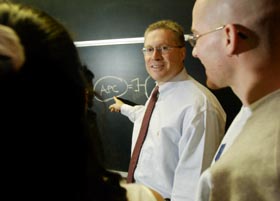|
This is an archived article.
For the latest news, go to the Advance Homepage
For more archives, go to the Advance Archive/Search Page. |
||
|
Zeff Wins Students' Vote As Dr. Richard Zeff has the great good fortune to have what he regards as the perfect job: he's a faculty member at a medical school. The students he teaches apparently also see him as a perfect fit for the job: they voted him the school's best teacher for 2003.
Zeff, an associate professor of pathology, is this year's winner of the Charles N. Loeser Award for Excellence in Teaching in the Basic Medical Sciences. The Loeser Award is presented yearly to a Health Center faculty member by second-year medical and dental students. It is the 29th time the Loeser award has been presented and the third time Zeff has won. The award is named in memory of anatomy professor Dr. Charles Loeser. The winner must possess scholarly curiosity; the ability to evoke in students an enthusiasm for learning; and a desire to give wholeheartedly of themselves to advance the welfare and education of their students. "I love our students," he says. "I derive tremendous pleasure from interacting with them." The feeling's mutual: "He's a terrific teacher," says Jamie Roach, now a third-year medical student and one of those who voted for Zeff. "He's a dynamic speaker," she says. "He knows what he's talking about, and he has the ability to convey information. He cares about each student and he makes sure students are enjoying the process of learning." Zeff has been teaching immunology at the Health Center for 16 years. His approach is grounded in the basic questions, "What do the students need to know?" and "What do I need to do to help them learn it." He also shares something in common with many winners of the Health Center's teaching award: he uses the blackboard. "I use the blackboard because it is a nice break from PowerPoint," he says. "Data isn't being thrust at the students via electronic means." Zeff says he uses schematic drawings to talk about immunology. "You can provide a lot of information in a sketch," he says. "Students can see and appreciate where the pieces fit in and they can make sense of very complex biological processes." Dr. Bruce Koeppen, dean for academic affairs and education, himself a four-time winner of the Loeser teaching award, describes Zeff as "a gifted and master teacher," adding that Zeff understands the students' perspective, and anticipates where they will have difficulty. "He also regularly encourages students to ask questions," adds Koeppen. "This ensures he has not moved too quickly through the material." Roach, the medical student, says Zeff "uses a nice mix of talking to us, asking questions, and drawing stuff on the board. He watches our faces to see if we look like we're getting it. The way Dr. Zeff teaches expands on each step and, because he draws, it allows the students' thought process to catch up with him." Zeff's interaction with students involves more than just top quality classroom teaching. He is a member of the admissions committee, so he meets many of the medical school's applicants; and, as a member of the curriculum development committee, he's an integral part of designing the program the students will experience. Administrators at the School of Medicine have always believed that school isn't just education alone, it's a life experience. It's a view Zeff shares: the literature club he started and hosts at his home gives students and faculty an opportunity to socialize and get to know one another away from the campus. Zeff holds a Ph.D. in immunology from Rush University in Chicago, where he had his first teaching experience: "Being in the lecture hall at Rush and facing those students was very intimidating, but it was very exciting too," he says. "I knew then I wanted to participate in the academic setting" After more than a decade-and-a-half of experience in lecture halls, Zeff still feels the exhilaration. "It's exciting for me when the new classes arrive," he says. Zeff sees his task as an educator as going beyond the provision of information. "It's vital for a teacher to be in touch with the students' needs, but also to be able to instruct them so that they know how to use the information," he says. "Successful teachers don't just share information with students," he adds, "they help them prepare for their futures." |

